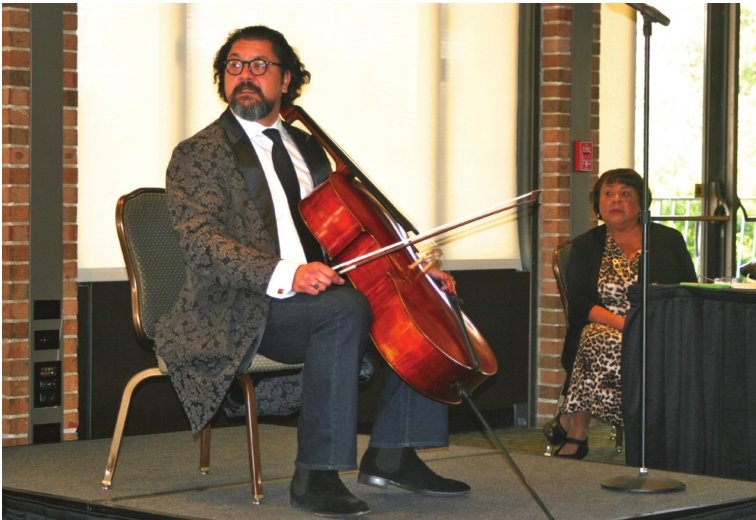
Can art and music bring peace to the world? Skeptics need to spend time with people like Karim Wasfi, conductor of the Iraqi National Symphony Orchestra.
Thanks to YouTube, Wasfi is known around the world for parking himself and his cello into 19 steaming craters of bombedout Baghdad neighborhoods — so far.
Wasfi cut a striking figure at an unusual event sponsored by Lansing’s Sister Cities Commission Friday.
He played the cello with a new friend, formidable Detroit pianist and composer Alvin Waddles, whom he had met two days before.
Instead of just talking about peace, the two musicians played a completely improvised work that followed a sorrowful yet hopeful emotional arc.
After some coaxing from Barbara Roberts Mason, president of Lansing’s Sister Cities Commission, he agreed to talk to the group as well.
“The only reason I performed at these bomb sites was to defy terror and intimidation, and every one of us has this inside of them,” Wasfi said.
In Baghdad and other parts of Iraq, Wasfi started three youth orchestras and nurtured the Iraqi National Symphony Orchestra back to life after the chaos following the American invasion and 2003 toppling of Saddam Hussein.
“We had military fighters who gave up their Kalashnikovs and became members of orchestras performing in different parts of Iraq,” Wasfi said.
The Iraqi National Symphony Orchestra is an intermittently uneasy mix of Shi’a, Sunni, Kurds, Turkmen and other ethnic and religious groups.
“Integration is essential, even if we disagree or even if we don’t tolerate each other,” Wasfi said.
Coaxed by Mason, Waddles walked away from the piano and lifted his stentorian voice in support of his new friend and colleague. He told the group what it was like to play improvised duets with a man he just met, from another musical tradition.
“His musical language isn’t mine, but while playing with him, it’s a matter of listening,” Waddles said. Waddles is known mostly for jazz, musical theater and classical music, but he adapted sensitively to Wasfi’s modern, free-floating idiom.
“It’s an honest combination, without bending, without breaking, without fighting,” Waddles said.
That sounded to many people in the room, including Wasfi, like a roadmap to peace.
“Seeing everything the same way isn’t peace,” Waddles said. “It’s not even realistic. We were created to listen, to hear one another.”
Among the 50-odd listeners in the room was Mark Auslander, director of the MSU Museum.
Listening to Wasfi and Waddles play, Auslander told the group he had a vision.
It reminded him of a verse the 137th Psalm: “By the rivers of Bablyon we sat and wept.”
“The captors ask the captives to sing songs of joy, which is the most terrible pain, and yet is suffused with the pleasure of the memory of the lost home, Jerusalem,” Auslander said.
He marveled as the music evolved from quietude to agitation to a fragile tranquility.
“It was honest and yet it returned to the trickle of the water,” Auslander said. “Everything was the same and everything was different.”
The mention of the rivers of Babylon reminded Mason of trips the Sister Cities Commission has made to Akuapim South District in Ghana, one of seven sister cities of Lansing. There, the delegation visits “slave river,” where people took their last bath before the boats carried them away to their new life as slaves.
“We sing by the rivers of Babylon every time we go,” Mason said.
The same reference reminded Woonsik Chong, a pastor at Northwest Minister Presbyterian Church in Lansing and a painter with a master’s degree in fine arts, of that day’s headlines, proclaiming a new round of peace talks between North and South Korea.
Chong said it took three generations to turn the suffering of the Jewish diaspora into the poetry of the 137th psalm — about the same interval since the start of the Korean War in 1950.
“I’m not surprised that it is the third generation in Korea that must make beauty out of what has been a chaos, violence and destruction,” Chong said.
Also listening at a table in the back of the hall was Zeline Jatu Pritchard, retired chief of women and adolescent health unit at the World Health Organization, who was in Lansing to visit family.
Pritchard spent decades working in wartorn African countries like Liberia.
“I’ve seen a lot of death,” she said. “I’ve seen babies on the backs of dead mothers that have been shot.” Her voice was a blend of authority, sadness and delight.
“I listened to the music,” she went on. “You heard the two gentlemen. They didn’t know each other before. But they compromised. They gave and they took. Please continue. This is a worthy cause.”
Support City Pulse - Donate Today!
Comments
No comments on this item Please log in to comment by clicking here